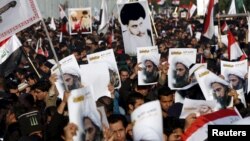Russia has offered to act as an intermediary between Iran and Saudi Arabia following Riyadh's execution of the prominent Shiite cleric Nimr al-Nimr.
Russian diplomatic sources were quoted saying Moscow is ready to invite Saudi and Iranian foreign ministers to Russia for talks.
“If our partners in Iran and Saudi Arabia are ready and willing (to come),” the source told Russia’s state TASS news agency, “our initiative remains in force.”
Other state-funded media reported Russia could play an important role to resolve the dispute because it is the only international player in the region seen as impartial by Tehran.
But Nikolay Kozhanov, an associate in the Russia and Eurasia Program at Chatham House and non-resident fellow at the Moscow Carnegie Center, says Russia’s close relations with Iran remain a problem for Saudi Arabia and its allies in the region.
“In order to be an intermediary, you need to be the third side in the conflict,” he said. “But, in Saudi Arabia, Russia is considered to be an Iranian ally or a partner. So, I do not believe people in Riyadh will trust the Russians completely or, better to say, they won't trust them.”
Russia’s arms sales to Iran, including advanced missile systems, have raised international concern. But Moscow has also played a constructive role in negotiating the deal to limit Tehran’s nuclear capabilities.
Russia’s support for Iran is limited by the need to not take sides in the Sunni-Shi’ite confrontation, as the vast majority of Russia’s 16 million Muslims are Sunni, Carnegie Center's Kozhanov said.
“The full-fledged alliance between Russia and Iran is not in the Russian interest. Because it will definitely have a negative effect on Russia's relations, not only with Saudi Arabia but also with Israel and with quite a number of countries in the middle eastern region, he said, adding "And so, the Russians are not ready to sacrifice these relations for the sake of Tehran.”
Iran-Saudi Arabia rift
Tensions between Iran and its Saudi Arabia ratcheted up over the weekend after Riyadh executed Shi’ite Muslim cleric Nimr-al-Nimr along with 46 others in a single day on terrorism charges.
Al-Nimr was a longtime critic of the Saudi government who was accused by Saudi Foreign Minister Adel al-Jubeir of agitating, organizing terrorist cells and providing them with weapons and money.
In response to the execution, Iranian protesters stormed Saudi Arabia's embassy in Tehran and a consulate.
Saudi Arabia quickly suspended diplomatic relations with Iran. Other Sunni governments limited diplomatic ties with Tehran in solidarity with Riyadh, including Bahrain, Sudan, the United Arab Emirates, and Kuwait, while Shi’ite-led countries, like Iraq, sided with Iran.
Iran’s President Hassan Rouhani condemned the attack on Saudi Arabia’s embassy and consulate, but also accused Riyadh of using it as an excuse to divert attention from the executions, which received widespread international condemnation.
Call for dialogue, restraint
Russia’s Foreign Ministry called for dialogue and urged Tehran, Riyadh and Gulf countries to show restraint.
Kozhanov says Russia usually tries to play mediator in order to acquire additional importance in the international arena and is not as interested in reaching a final result so much as in the process itself. But he says Moscow could still play a role in shuttle diplomacy between the long-time rivals.
The dispute has prompted fears for regional security and for the Syrian peace talks, in which both countries are involved.
On Tuesday, Saudi Arabia said its relations with Iran would not affect talks on Syria, with another round reportedly scheduled in Geneva this month. In those peace talks too, Russia has played mediator role, using its closeness to Syrian President Bashar al-Assad as a way to influence the peace process. Russia and the United States led a meeting on Syria in December with foreign ministers from Iran and Saudi Arabia.
But Kozhanov believes the feud could hamper those efforts.
“Definitely, the conflict between Iran and Saudi Arabia will have a negative impact on (their relations) and affect (the) Saudi's willingness to discuss Syria with Iran," he said.





